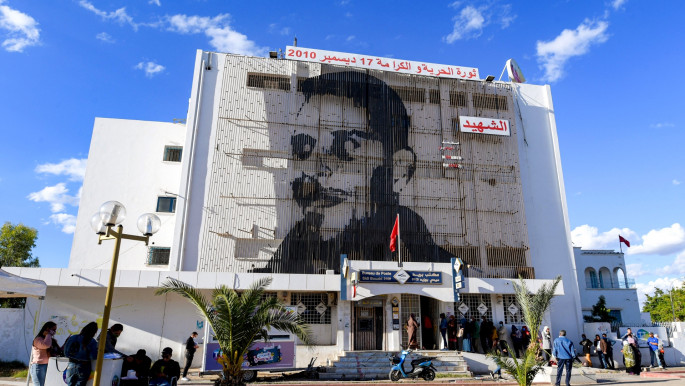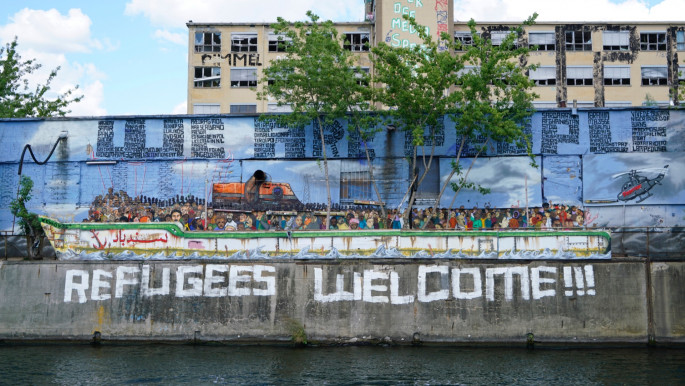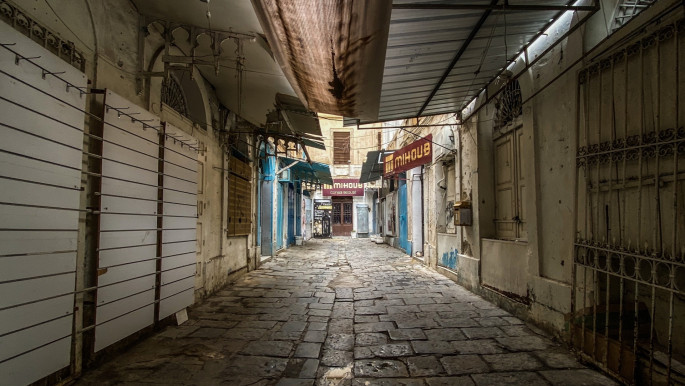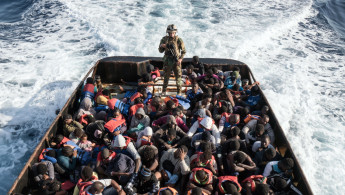Cashing in on misery: Despite Covid-19, North Africa's human traffickers are thriving
Covid-19 has led to unprecedented job losses worldwide and human trafficking is a serious concern in Africa, where practically all countries in the northern region serve as a source, transit point and destination for the trade in human beings.
While lockdown measures have temporarily stalled or even stranded migrants in some cases, they have also created new opportunities for smugglers and traffickers willing to take on the increased risks for higher premiums.
"Organized crime groups continue to take advantage of vulnerable people seeking a better life, especially during COVID-19, and demand large sums of money with little or no concern for their welfare," Interpol Secretary-General Jurgen Stock said last December.
Border closures and restrictions have not only resulted in an increase in the smuggling of migrants and refugees, but also in the use of more perilous pathways and conditions, leaving them exposed to further abuse, exploitation and human trafficking.
In spite of the pandemic, migrants and refugees are continuing to arrive in smuggling hubs in the Sahel region. Many are still trying to reach Europe as humanitarian conditions deteriorate in Libya, attempting dangerous sea journeys and facing the risk of virus transmission in the absence of basic health and hygiene standards en route.
 |
Border closures and restrictions have not only resulted in an increase in the smuggling of migrants and refugees, but also in the use of more perilous pathways |  |
The exponential rise in unemployment, falling incomes, food insecurity, and a focus on implementing coronavirus restrictions by law enforcement agencies will likely see human trafficking continue to increase. In sub-Saharan Africa, which moved into a recession in 2020 for the first time in 25 years, the economy is set to shrink significantly, compounding the crisis of smuggling.
Libya
Human trafficking persists in Libya amid a context of ongoing armed conflict, insecurity and lawlessness, with victims prone to violence and other human rights abuses at the hands of governmental and non-state armed groups and militias.
The plight of the tens of thousands of refugees, asylum-seekers and migrants in Libya has been widely documented through victims' accounts of rights violations, including abduction for ransom and extortion, arbitrary detention in inhumane conditions, forced labour and exploitation, sexual violence, torture and other ill-treatment.
 |
|
| Read more: A decade on, Tunisia's revolutionary demand for economic justice remains unmet |
Typically coming from sub-Saharan and Sahel states, the majority are living in precarious conditions, highly exposed to arbitrary arrest, trafficking and exploitation, including those seeking work in Libya or transiting Libya en route to Europe.
In a climate of near-total impunity, criminal networks, militia groups, government officials, private employers and traffickers continue to use migrants, refugees and asylum-seekers in sex and labour trafficking.
Refugees and migrants risk their lives at sea attempting to cross the Mediterranean to Europe, only to be intercepted, transferred back to Libya and delivered to the same abuses they sought to escape. The Covid-19 crisis has not had a considerable effect in terms of disrupting smuggling operations as people continue to be transited along this route.
Jonathan Tossell, a researcher at Clingendael's Conflict Research Unit focussing on Libya, explained to The New Arab that smugglers, after an initial halt to their activity at the onset of the pandemic, re-adapted and found alternative avenues to transport and trade people. Smuggling and trafficking routes have become more clandestine, sometimes overlapping with those of drug traffickers and arms dealers, in turn creating greater dangers for migrants.
"This often means prospective migrants are dealing with multiple smugglers, which leaves them in the hands of more dangerous entities and trafficking groups," Tossell said.
With the EU aiding the Libyan coastguard in forcing back migrants and making illegal departures harder, smugglers and traffickers have more financial incentives in preventing the disembarkation of migrants and returning them for detention and further exploitation.
 |
While lockdown measures had temporarily stalled trafficking, they have also created new opportunities for smugglers willing to take on the increased risks for higher premiums |  |
"The business model has now changed, it's more profitable to detain a migrant rather than transport him to a disembarkation point," Tossel said, noting that it is becoming an increasingly viable revenue stream.
Amnesty International's research found that refugees and migrants are in constant danger of being arrested and sent to detention centres as well as being kidnapped by militias, armed groups and traffickers. Some are exploited by employers, subjected to forced labour by traffickers, and others are tortured or raped until their families pay ransoms to secure their release.
Moreover, in a time of pandemic, many live in unsanitary conditions increasing their vulnerability to the threat of the virus, with limited or no access to healthcare.
The economic knock-on effect of the coronavirus crisis for migrants has meant finding very little to no work available in Libya, where they would normally travel within the country, stop at different points and take up any opportunity to make money to then move on. Now, instead, they spend more time in the hinterland taking longer to accrue the necessary finances to keep going before they can reach a migration hub.
"Spending extended periods in these areas leaves these people at greater vulnerability to trafficking," Tossell observed, highlighting how migrants are seen as commodities. "If they can't work and generate revenue, the next option for traffickers will be detaining and extorting them to pay their way out of detention centres".
 |
|
| Read more: 'No one should be left to die': Fighting to protect refugees in Europe amid Covid-19 |
Algeria
Algeria represents a key destination and transit country for migrants, with the south becoming a strategic gateway for people seeking jobs or refuge in southern or northern hubs, or continuing their journey towards Morocco and Europe.
The southern city of Tamanrasset is the most important gathering point for migrant communities coming from the Sahel, West and Central Africa, from which smugglers organise the logistics, lodging and transportation for migrants.
Also serving as a stepping-stone country, Algeria has long attracted migrants coming through the southern pathway to work for months at a time, returning home after earning the desired amount of income. Declining economic opportunities have driven migrants to stay longer periods in order to earn enough money to take back home, with some spending up to three years in the country. People typically find jobs in the south, or take a greater risk and travel north.
With Algeria's increased crackdown on human smuggling across the region, journeys have become more difficult and perilous, leading smuggling networks to adapt using longer and riskier off-road desert routes, and raising prices.
Despite that, thousands of undocumented sub-Saharans keep traveling to Algeria via the Central Sahara route. They are the most vulnerable to labour and sex trafficking because of their irregular migration status, poverty, and sometimes language barriers.
 |
Smuggling routes have become more clandestine, sometimes overlapping with those of drug traffickers and arms dealers, in turn creating greater dangers for migrants |  |
Raouf Farrah, a senior analyst at Global Initiative Against Transnational Organized Crime (GI-TOC) specialising in migration and criminal economies in North Africa and the Sahel, detailed the irregular migration and human smuggling dynamics in southern Algeria in a report published last month.
The study found that in the city of Tamanrasset, which hosts the largest migrant population the country's south, intermediaries liaise with foyer chiefs to place migrants in basic or makeshift group houses ('foyers') upon their arrival in the city, often in poor conditions with limited sanitation.
Though less lucrative than cross-border transportation, renting foyers to migrant workers is still profitable and much less risky. Migrants who cannot pay the intermediary fee and the first month of rent start working a cleaners or in the foyers' kitchens.
Tamanrasset has become a destination specifically for begging, where Nigerian women and children from Zinder, together with other sub-Saharans, dominate the human trafficking market. Unaccompanied women traveling with children, mostly West African nationals who are recruited from the community, fall prey to begging, sexual exploitation and forced domestic labour in Algeria.
 |
|
| Read more: Trapped in Lebanon: Fears of abuse for migrant domestic workers amid Covid-19 lockdown |
Traffickers may use false promises of work, such as in a beauty salon or restaurant, to recruit migrants. They often use restaurants, houses, or informal worksites to exploit victims.
"Women are usually promised jobs in northern Algeria, then are very vulnerable once they arrive in the south. When they're not begging, they're cooking or taking care of the house or working in foyer's restaurants," GI-TOC's analyst told The New Arab, adding that if they journey north they may be lured into the sex trade.
With the arrival of Covid-19, social distancing and mobility restrictions have significantly affected migrant communities. The closing of borders in North Africa and the Sahel has especially deprived unaccompanied sub-Saharan females of ways to collect money and send remittances to their families.
"The pandemic dramatically put migrants in a very complicated situation, leaving them stuck with no opportunities and no way to go back home," Farrah says. "Women have grown extremely susceptible to human trafficking".
The lines between human smuggling and human trafficking have become even more blurred along Algeria's borders with Niger and Mali. According to GI-TOC's report, some smugglers operating along the Mali–Algeria border exploit migrants by forcing them into labour or sexual servitude under the threat of violence. Some traffickers have been long known for connecting with armed groups and bandits who target migrants' vehicles, threatening and torturing them until they or their family members make payments.
In its 2020 Trafficking in Persons Report, the United States ranked Algeria on its "Tier-3 watch list", the lowest rank among the countries where the illegal trade in people is widespread.
The report denounced the Algerian government for its ineffective screening measures for trafficking victims among vulnerable populations such as African migrants, refugees and asylum-seekers, and the failure to provide victims with appropriate protection services. It also urged Algerian authorities to prosecute trafficking offenders and punish them with adequate penalties.
 |
The business model has now changed, it's more profitable to detain a migrant rather than transport him to a disembarkation point |  |
Tunisia
In Tunisia, human traffickers exploit both domestic and foreign victims, with migrants being particularly vulnerable to sexual exploitation, domestic servitude, and other forms of forced labour.
Civil society groups and international organisations claim that traffickers increasingly exploit women, primarily from West Africa and particularly from the Ivory Coast, in forced domestic work in private homes in Tunis, Sfax, Sousse, and Gabes.
Civil society organisations also report that male migrants from sub-Saharan Africa working in poor working conditions may be vulnerable to forced labour. In some cases, men from the Ivory Coast - both well-educated, uneducated or non-skilled individuals - have been targeted by recruiters in the country, with fraudulent promises of work in Tunisia, to then be forced into domestic work, construction, or agriculture.
Common issues like access to legal documentation, livelihoods and education make migrants, refugees and asylum-seekers vulnerable to exploitation and abuse, with smuggling and trafficking practices becoming key concerns, especially in the Libyan-Tunisian borderlands.
With the Covid-19 outbreak and its heavy economic impact, newly arrived and established migrants are facing difficulties in finding work, food and paying their rent. The crisis has made their situations even more fragile as they are not able to save money to survive the lockdown period. Fearing eviction and finding themselves on the street, their irregular situation further exposes them to abusers and traffickers.
 |
|
| Read more: 'No work, no money': African migrants struggle to cope under Tunisia's coronavirus lockdown |
In addition, some Tunisian children are vulnerable to forced labour and sex trafficking. There are more and more street children selling goods and rural children doing farm work to support their families, who then become prone to trafficking.
One disturbing phenomenon has seen Tunisian girls working as domestic servants for wealthy families in the capital and major coastal cities, who are extremely vulnerable to trafficking, physical and psychological violence as well as sexual abuse.
An investigative report published in December 2018 by Tunisian independent media outlet Inkyfada looked into the reality of Fernana, in the rural north-western part of the country, where there are numerous reported cases of underage girls from disadvantaged families who are forced to quit school and sent by their parents, especially their fathers, to work as maids.
These female minors are expected to carry out household and care tasks, in demanding working conditions. They endure humiliation and ill-treatment, sometimes physical and psychological violence as well as sexual abuse. Fathers receive the young girls' wages, shared with middle-men who receive a fee payment on the transaction.
In the context of the coronavirus pandemic, the human trafficking industry has found ways to get around new hurdles, including in the North African region, with a heightened impact for the victims.
Confinement measures and other restrictions can make them more invisible, but also more exposed to contracting the virus, with less access to healthcare. Already complex to detect, human trafficking has been pushed deeper into the shadows by the pandemic, with the increased likelihood of its victims being exploited.
Alessandra Bajec is a freelance journalist currently based in Tunis.
Follow her on Twitter: @AlessandraBajec



